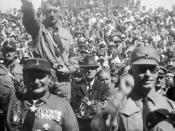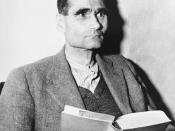The story of Nuremberg tells the tail of the twenty two last remaining Nazi's who were put on trial for committing war crimes. Under Hitler's power they thought this outcome would never be possible, but with the fall of the Nazi party, sweet justice was served. Millions of the Jewish faith were brutally killed with lack of any good reasoning. For the few that survived, and the family member's who morn the loss of loved ones nothing could be more fitting then to see these men be punished to the fullest extent of the law.
Nuremberg goes into great depth to explain the numerous problems faced to setup a trial of this stature. Problems like finding interpreters to translate from language to language, and also one who can do it quick enough to not slow the court down to a snail's pace. English, German, and French all had to be spoken in a way for everyone to understand.
IBM helped with this by developing a machine that could translate one language to another. Another problem that was faced was gathering up the enormous mounds of written evidence that was recorded by the Nazi party. The prosecution could not solely rely on questioning the witness as enough proof to prosecute them, so countless books, notes, videos, and documents were gathered to help help put the defendants away.
Another huge hurdle that had to be overcome was setting up the courthouse to accommodate such an amount of people who would be attending a trial of this magnitude. And entire area was devoted to the press to take pictures and record parts of the trial. Theater seats were gathered from a nearby opera house to seat the rest of those attending the trial. Because of the recent bombings in Nuremberg before the trial, the courthouse had to be nearly rebuilt to suit the needs of the trial. This took much time to prepare.
Housing also had to be located for the prosecutors, lawyers, judges, and anyone else who had to be in court everyday. This was a challenge not only because buildings that were left untouched by the bombings and were considered livable were scarce, much nicer accommodations had to be located for those who were of higher class.
One of the main men behind such a tragedy as the holocaust is Hermann Goring. "During the Polish campaign, Goring's shrieking Stuka dive bombers knocked the Polish air force out of the war. Hitler was much impressed by the strategic potential of airpower and, in 1940 he elevated Goring to Reichsmarschall, the highest military rank in Germany. A year later, he formally designated Goring as his successor in the event of his death." I believe this was the beginning of the true power of Goring. With the trust instilled in him by his leader, Hitler, Goring would do everything possible to have Hitle;s orders fulfilled. It was this power that seemed to make Goring lose all human emotion and respect for life.
During the trial a movie was shown that was filmed by an OSS team. The film showed two hundred prisoners at a concentration camp in Leipzig being lead into a barn, then having the structure set ablaze. The book then does on describing the defendants reactions while the film was being played. All showing worried expressions, holding back tears, and becoming nervous except for Goring. "Goring leans on elbows, yawns." To not have a reaction to a film showing innocent lives being lost, and to have the audacity to yawn is un-comprehensible.
One defendant who's story I found particularly interesting was that of Rudolf Hess. Hess was a deputy fuhrer, and a third ranking Nazi until his flight to Scotland in 1941. In lieu of giving up information upon his capture, Hess told the prison guards that he had suffered from Amnesia and could not remember anything from his past. He thought it would be unfair to put a man on trial and punish him for acts he did in the past if he could not remember doing them. Once at trial, Hess changed his mind about his fake ailment and decided to defend himself in court by saying "My capacity to follow the trial, to defend myself, to put questions to witnesses, to answer questions myself is not affected." After literally playing dumb for the last five year with a made up sickness, I thought it was rather a bold move to suddenly come clean and testify for himself at the last moment before his trial began. His revealing of normalcy put the accuracy of the two prison psychiatrists in question. "They had believed in the man's mental impairment. Their professional reputations were on the line." The only one on the prison staff who never thought Hess' impairment was legit was Burton Andrus. "The two men left, subdued. Could the have been wrong and a layman like Burton Andrus right?" Andrus was the only one who could see right through Hess the entire time.
Many, including myself,saw these men as subhuman animals for the cruel and brutal acts put forth upon a single race in hopes to wipe them off the face of the earth. But to these twenty two men they saw it as just doing their job for their country's leader. Much like our military does under the President of the United States. They did not see their acts as brutal, but as a mission required to complete in order to strengthen their country and succeed in power, and ultimately that is the goal for every country.
Works CitedPersico,Joseph. Nuremberg: Infamy on Trial. New York: Penguin Group, 1994




